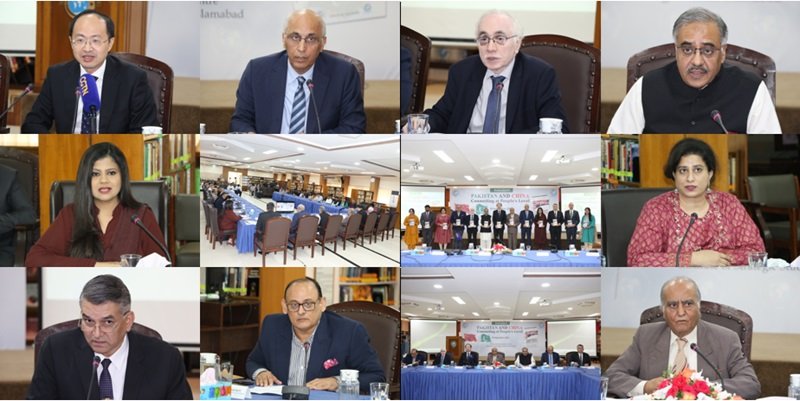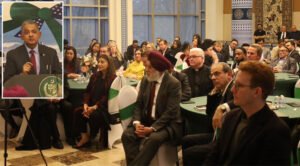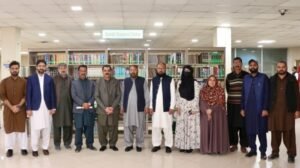
ISSI launches Book ‘Pakistan and China: Connecting at People’s Level’
Islamabad : China-Pakistan Study Centre (CPSC) at the Institute of Strategic Studies Islamabad (ISSI) organised the launch of its latest book titled Pakistan and China: Connecting at People’s Level. The event featured remarks by Ambassador Masood Khalid, Pakistan’s former Ambassador to China; Ambassador Moin-ul-Haque, Pakistan’s former Ambassador Pakistan to China; Dr. Hassan Daud Butt, Senior Associate Professor at Bahria University; Dr. Sundus Mustaqeem, Assistant Professor at NUST; and Aiza Azam, Lecturer at Air University. Xu Hangtian, Minister-Counsellor at the Embassy of the People’s Republic of China was the guest of honour.
Director General ISSI Ambassador Sohail Mahmood, in his welcome remarks, termed Pakistan-China relations as ‘unique in inter-state relations,’ based on mutual respect, strategic mutual trust, and mutual support on each other’s issues of core interests. He highlighted that this all-weather strategic cooperative partnership has endured regional and global changes for more than seven decades, and continues to serve as a positive factor for peace, stability and development in the region and beyond. Ambassador Soahil Mahmood emphasized that the launch of this book is both timely and significant.
Ambassador Moin-ul-Haq underlined that Pakistan-China relations remain the cornerstone of Pakistan’s foreign policy. He highlighted the deep warmth and respect the Chinese people hold for Pakistan. He identified five priority areas for strengthening people-to-people ties: civilizational connections, cultural exchanges, economic partnerships, technological collaboration, and tourism. He highlighted the role of initiatives such as Gandhara civilization exhibitions and proposed establishment of joint IT parks in every province, as well as group tourism programs. He stressed that the forthcoming 75th anniversary of diplomatic ties in 2026 provides an ideal opportunity to launch people-centric initiatives.
Dr. Hassan Daud Butt noted that the book coincides with the second phase of CPEC, characterized by deeper institutional and societal linkages. He underlined that people-to-people interaction forms the backbone of sustainable partnerships and praised the book’s contribution in showcasing cultural, educational, and social dimensions, from student exchanges to maritime tourism.
Dr. Sundus Mustaqeem stressed that education, culture, media, and tourism are vital for deeper people-to-people ties and urged Pakistan to strengthen its film and digital media presence. Ms. Aiza Azam highlighted that people-to-people connections span business, cuisine, education, and the arts. She emphasized the value of structured exchanges and academic dialogue in shaping a shared vision.
Ambassador Masood Khalid praised the inclusion of themes such as maritime tourism and the blue economy, noting that Pakistan could generate up to USD 1.5 billion annually from tourism with China’s collaboration. He stressed the importance of expanding sister-city partnerships, cultural exchanges, and think tank cooperation under the new five-year Action plan. He also cautioned that attempts are being made to create misunderstandings in Pakistan-China relations and argued that the best response is to deepen people-to-people linkages.
Xu Hangtian, echoing President Xi Jinping’s words, emphasized that people are the foundation of history and the future. He cited examples of solidarity between the two nations during COVID-19 and natural disasters, highlighting the resilience of the friendship. He noted rising cultural and educational exchanges, with sister-city linkages growing from 8 to 19 in the last decade and Pakistani student enrollment in China nearly doubling. He also pointed to the 17% rise in Chinese visas for Pakistani businessmen in 2024 and further increases in 2025. Stressing the importance of media, tourism, and youth engagement, he warned against disinformation campaigns and underlined the need for counterterrorism cooperation to unlock the full potential of exchanges. He reaffirmed China’s commitment to strengthening people-to-people ties under the five-year action plan, including new measures such as expanding direct air links.
Earlier, Dr. Talat Shabbir observed that the book highlights the often-overlooked people-to-people dimension of Pakistan–China relations. By focusing on education, tourism, cultural exchanges, media cooperation, and soft power, it shows how shared human experiences and cultural empathy can sustain the partnership beyond strategic projects like CPEC.
In his concluding remarks, Ambassador Khalid Mahmood highlighted the significance of people-to-people contacts in advancing Pakistan–China relations within the framework of public diplomacy. He commended CPSC for producing a timely and well-researched publication that makes a valuable contribution in this important domain.
The event brought together senior diplomats, academics, scholars, and policymakers to reflect on the often-overlooked social and cultural dimensions of Pakistan-China relations.







